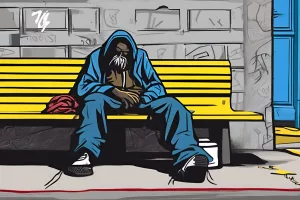Sisisi Tolashe is the new Minister of Social Development in South Africa, tasked with overseeing the South African Social Security Agency (SASSA) grants and the Department of Social Development (DSD). She faces significant challenges, including streamlining the payment method for SASSA grants and potentially rolling out a Basic Income Grant in the future. With her political and public service experience, Tolashe and her deputy, Ganief Hendricks, offer a beacon of hope for South Africa’s most vulnerable citizens, despite the daunting tasks that lie ahead.
“Decoding the Mystery of Fourways’ ‘Informal Traffic Regulators’: Saviors or Miscreants?”
In Fourways, Johannesburg, selfproclaimed ‘informal traffic controllers’ have taken on the role of managing traffic at major crossroads. While some appreciate their efforts, others accuse them of exploiting malfunctioning traffic signals for personal gain. The Johannesburg Metropolitan Police Department urges motorists to treat junctions as mandatory halt points and not encourage these informal traffic controllers. The story offers insight into the complex dynamics of urban life.
A devastating fire tore through the shacks of Nomzamo, Cape Town, claiming two lives and leaving several homeless. The shanties had no formal electricity connections, and residents had been ignored when raising concerns about illegal connections. The tragedy highlights the urgent need for attention to basic living conditions and the widening gap between the affluent and the deprived, but also speaks of fortitude, community, and survival.
MyCiTi bus fares in Cape Town have increased by 5%, causing financial strain for commuters. The increase impacts peak and offpeak travel costs and has been met with criticism due to malfunctioning buses, defective tapout systems, and poor customer service. The City of Cape Town blames rising operational costs for the fare increase. Commuters continue to struggle with financial stress in an increasingly complex urban environment.
The Parliament of South Africa has opened applications for media professionals seeking accreditation for coverage of the 2024 Opening of Parliament Address. This event, held every five years, signifies the start of the new parliamentary term, with the newly elected State President introducing their administration’s vision and priorities. The accreditation process is straightforward, requiring online submission of specific information, bridging the gap between Parliament and citizens, and promoting transparency in the democratic process.
South Africa has formed a groundbreaking coalition government comprising eleven political parties after a landmark election on May 29, 2021. The Government of National Unity (GNU) exemplifies unity, diversity, and collective responsibility, with a mandate to combat poverty and inequality, establish a more equitable society, and prioritize rapid, inclusive, and sustainable economic growth. The appointed executives represent the nation’s diversity and are not there to serve a specific constituency, party, or societal section, reflecting the country’s democratic ambitions. The coalition plans to organize a National Dialogue to work collaboratively to tackle the nation’s critical challenges.
Constable Huram Louw, a Cape Town policeman, has sparked controversy with his social media videos expressing his desire to pursue acting in Hollywood and grievances with the South African Police Service. His pursuit of his dream highlights issues within the SAPS, including alleged mishandling of the LGBTQI+ community and personal ambition versus professional responsibility. Despite pushback from the SAPS against officers engaging on social media in uniform, Louw’s story continues to captivate audiences and shed light on important issues.
In July 2024, the City of Cape Town will conduct essential maintenance on their water supply network to enhance water efficiency and sustainability. However, residents may experience temporary water disruptions and should store ample water in anticipation. The project includes zeropressure tests and the installation of intelligent pressurereducing valves to minimize leaks and pipe bursts, resulting in a more effective water supply system. The City encourages residents to follow @CityofCTAlerts for updates and information throughout this period.
The sudden surge of homelessness in Paarl, Cape Town, due to an influx of 30 individuals from Cape Town has led to the rise of makeshift structures along the Berg River. Efforts are being made by the Drakenstein Municipality, in collaboration with multiple stakeholders, to relocate the homeless individuals and sanitize the affected areas. The municipality is adopting a more compassionate and sustainable approach to address homelessness in a comprehensive manner, including the establishment of an overnight shelter. The goal is to create a safe and supportive environment that offers access to essential services for the homeless individuals.
In South Africa, a complex legal battle involving the Nuveld farmers has escalated with the potential to put numerous officials, including Thoko Didiza, in jail. The dispute began in 2009 when the Department of Rural Development and Land Reform allocated five farms to over 80 beneficiaries, including the Nuveld farmers. Despite their success, the department allegedly took two of their farms earlier this year, leading to a legal battle that resulted in the recent verdict of contempt of court for Didiza and other officials. The situation highlights the challenges of land reform and rural development in a democratic society.
The passing of Edith Sanders during the Cape Town Cycle Tour has sparked an inquiry by the South African Police Service. Eddie, in her nineties, was hit by a cyclist during the event and later succumbed to her injuries. Her son has appealed to witnesses to come forward, underlining the importance of eyewitness testimonies. Eddie’s life, a blend of happiness and tragedy, serves as a reminder of life’s unpredictability and the importance of living with vitality and fortitude.
Artists and athletes from Africa and Asia are unhappy with the high rate of Schengen visa rejections, which they liken to ‘global apartheid.’ They say that it disproportionately affects countries where people struggle to pay the visa fees, making it harder for them to access international opportunities. High fees and rejection rates could lead to a lack of diversity in art and sports, as talented people from certain regions may miss out.
A tragic accident in Klapmuts shook the community as 21 workers were involved in a severe bakkie accident. The incident highlighted the dangers of worker transportation, leading to demands for government action. A social media video captured the distressing scene as paramedics worked tirelessly to save the injured workers. The Congress of South African Trade Unions (Cosatu) pledged to work with the Labour Department to prevent such tragedies in the future and tackle unsafe transportation practices.
The strength of a passport is crucial for global travel, and South Africa’s passport ranks at 52 on the Henley & Partners Passport Index, with a visafree score of 108. This means that South African passport holders can visit 108 countries worldwide without a visa, including destinations in Africa, the Americas, Asia, the Caribbean, Europe, the Middle East, and Oceania. While some countries provide visas upon arrival, others require an electronic travel authority. The index highlights the disparities in worldwide travel freedom, but South African passport bearers have access to a rich spectrum of experiences and limitless exploration potential.
South Africa’s National Assembly is establishing a new parliamentary structure for its seventh term, focusing on creating a diverse and inclusive representation. The Programme Committee, responsible for determining the House’s agenda, and the Subcommittee on Review of NA Rules, ensuring the Assembly’s rules and practices’ integrity, are key players in this endeavor. The Rules Committee is developing new rules and procedures, with a comprehensive rulebook serving as the foundation of the NA’s operation. With the Chamber holding historical and symbolic importance, the National Assembly is wellprepared to lay a robust foundation for an effective parliament.
Monkeypox, a virus related to smallpox, has evolved to include sexual transmission in addition to transmission through physical contact with infected animals, respiratory droplets, and scratches or bites. Symptoms include fever, rash, muscle aches, and swollen glands and can be fatal in severe cases. While treatments like Tecovirimat are available for severe cases, prevention through hand hygiene and seeking medical attention at the earliest sign of symptoms is critical to managing the spread of the disease. Monkeypox does not discriminate by gender, age, or sexual orientation.
















